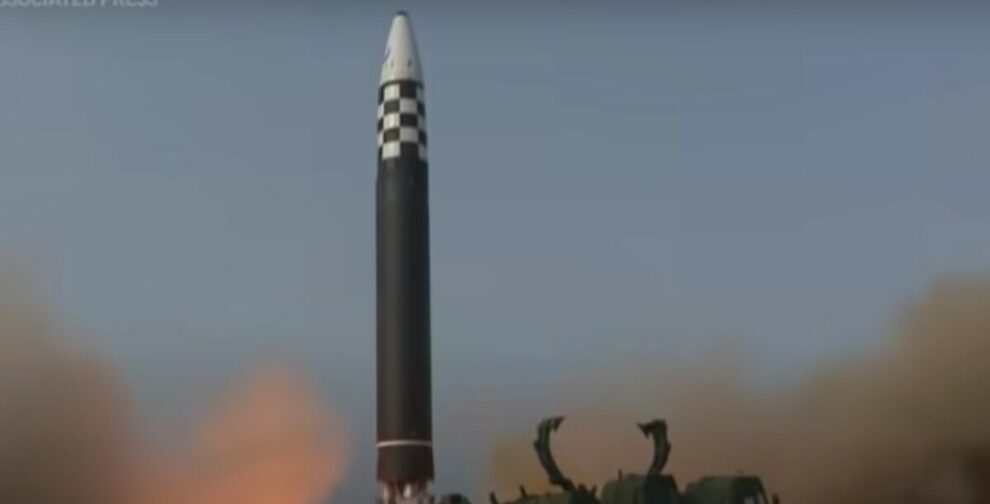North Korea fired a medium-range ballistic missile on Tuesday, with South Korea, the United States and Japan conducting a joint aerial exercise involving nuclear-capable B-52H bombers just hours later.
Pyongyang’s latest launch comes less than two weeks after Kim supervised a solid-fuel engine test for a new intermediate-range hypersonic missile (IRBM), with experts suggesting the Tuesday launch could be of the same weapon.
Seoul’s military said the missile, launched early Tuesday, flew around 600 kilometres (373 miles) before splashing down in waters between South Korea and Japan.
The Joint Chiefs of Staff said the military was analysing the launch, with a defence official telling the Yonhap news agency that it had likely involved a hypersonic warhead “on top of the delivery system used in the engine test last month”.
North Korea has long sought to master more advanced hypersonic and solid fuel technologies, to make its missiles more capable to neutralise South Korean-US missile defence systems and threaten America’s regional military bases.
In January, Pyongyang said it had launched a solid-fuel IRBM tipped with a hypersonic warhead, then last month flagged the successful engine test of the “new-type intermediate-range hypersonic missile”.
Hypersonic missiles are faster and can manoeuvre mid-flight, making them harder to track and intercept, while solid-fuel missiles do not need to be fuelled before launch, making them harder to find and destroy, as well as quicker to use.
Seoul’s defence ministry said it conducted a joint aerial exercise with Washington and Tokyo on Tuesday involving a nuclear-capable B-52H bomber and F-15K fighter jets near the Korean peninsula.
The drill aimed to “improve joint readiness against the North’s nuclear and missile threats,” it said.
The Tuesday launch “appears to be part of Pyongyang’s missile development blueprint, including hypersonic weapons,” said Han Kwon-hee of the Korea Association of Defence Industry Studies.
It seems Kim is developing such technology domestically, rather than with Russian help “given the sensitive nature of the weapons”, he added.
The United States as well as Germany condemned the missile test, with a State Department spokesperson saying that such launches violate UN Security Council resolutions and “pose a threat” to North Korea’s neighbours.
Germany’s foreign ministry “strongly” condemned the “illegal launch”, urging Pyongyang to enter negotiations with Seoul and Washington to dismantle its nuclear and missile programs.
The test comes just days after a Russian veto at the United Nations ended UN expert monitoring of North Korean sanctions violations, amid a probe into alleged arms transfers between Moscow and Pyongyang.
North Korea has yet to comment on the development.
It also comes just over a week before South Korea votes in a general election, in which the party of hawkish President Yoon Suk Yeol, who has taken a tough line with Pyongyang, is seeking to win back control of the parliament.
“The Kim regime prioritises advancing its military capabilities and doesn’t care to stay quiet during the South Korean legislative election campaign,” said Leif-Eric Easley, a professor at Ewha University in Seoul.
“But firing an intermediate-range missile lacks the shock value of a full-range ICBM launch or a nuclear test, so it’s unlikely to swing any National Assembly seats.”
Pyongyang has been under a raft of sanctions since its second nuclear test in 2009, but the development of its nuclear and weapons programmes has continued unabated.
So far this year, the nuclear-armed North has declared South Korea its “principal enemy”, jettisoned agencies dedicated to reunification and outreach, and threatened war over “even 0.001 mm” of territorial infringement.
Last month, the United States and South Korea staged one of their major annual joint military exercises, prompting angry retorts and live-fire drills from nuclear-armed Pyongyang, which condemns all such exercises as rehearsals for invasion.
Seoul is one of Washington’s key regional allies, and the United States has stationed about 27,000 American soldiers in the South to help protect it against North Korea.
